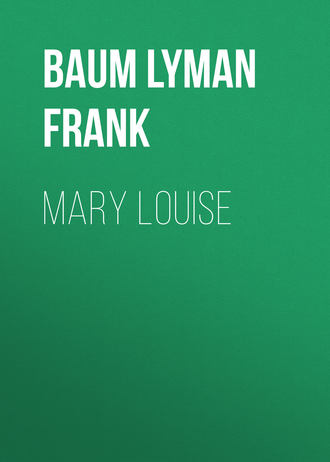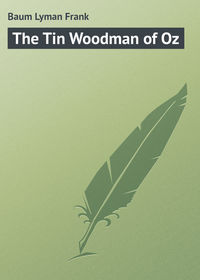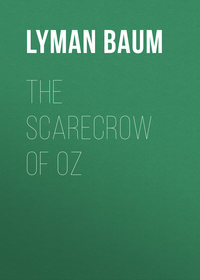 полная версия
полная версияMary Louise

Edith van Dyne
Mary Louise
TO YOUNG READERS
You will like Mary Louise because she is so much like yourself. Mrs. Van Dyne has succeeded in finding a very human girl for her heroine; Mary Louise is really not a fiction character at all. Perhaps you know the author through her "Aunt Jane's Nieces" stories; then you don't need to be told that you will want to read all the volumes that will be written about lovable Mary Louise. Mrs. Van Dyne is recognized as one of the most interesting writers for girls to-day. Her success is largely due to the fact that she does not write DOWN to her young readers; she realizes that the girl of to-day does not have to be babied, and that her quick mind is able to appreciate stories that are as well planned and cleverly told as adult fiction.
That is the theory behind "The Bluebird Books." If you are the girl who likes books of individuality – wholesome without being tiresome, and full of action without being sensational – then you are just the girl for whom the series is being written. "Mary Louise" is more than a worthy successor to the "Aunt Jane's Nieces Series" – it has merit which you will quickly recognize.
CHAPTER I
JUST AN ARGUMENT
"It's positively cruel!" pouted Jennie Allen, one of a group of girls occupying a garden bench in the ample grounds of Miss Stearne's School for Girls, at Beverly.
"It's worse than that; it's insulting," declared Mable Westervelt, her big dark eyes flashing indignantly.
"Doesn't it seem to reflect on our characters?" timidly asked Dorothy Knerr.
"Indeed it does!" asserted Sue Finley. "But here comes Mary Louise; let's ask her opinion."
"Phoo! Mary Louise is only a day scholar," said Jennie. "The restriction doesn't apply to her at all."
"I'd like to hear what she says, anyhow," remarked Dorothy. "Mary Louise has a way of untangling things, you know."
"She's rather too officious to suit me," Mable Westervelt retorted, "and she's younger than any of us. One would think, the way she poses as monitor at this second-rate, run-down boarding school, that Mary Louise Burrows made the world."
"Oh, Mable! I've never known her to pose at all," said Sue. "But, hush; she mustn't overhear us and, besides, if we want her to intercede with Miss Stearne we must not offend her."
The girl they were discussing came leisurely down a path, her books under one arm, the other hand holding a class paper which she examined in a cursory way as she walked. She wore a dark skirt and a simple shirtwaist, both quite modish and becoming, and her shoes were the admiration and envy of half the girls at the school. Dorothy Knerr used to say that "Mary Louise's clothes always looked as if they grew on her," but that may have been partially accounted for by the grace of her slim form and her unconscious but distinctive poise of bearing. Few people would describe Mary Louise Burrows as beautiful, while all would agree that she possessed charming manners. And she was fifteen – an age when many girls are both awkward and shy.
As she drew near to the group on the bench they ceased discussing Mary Louise but continued angrily to canvass their latest grievance.
"What do you think, Mary Louise," demanded Jennie, as the girl paused before them, "of this latest outrage?"
"What outrage, Jen?" with a whimsical smile at their indignant faces.
"This latest decree of the tyrant Stearne. Didn't you see it posted on the blackboard this morning? 'The young ladies will hereafter refrain from leaving the school grounds after the hour of six p.m., unless written permission is first secured from the Principal. Any infraction of this rule will result in suspension or permanent dismissal.' We're determined not to stand for this rule a single minute. We intend to strike for our liberties."
"Well," said Mary Louise reflectively, "I'm not surprised. The wonder is that Miss Stearne hasn't stopped your evening parades before now. This is a small school in a small town, where everyone knows everyone else; otherwise you'd have been guarded as jealously as if you were in a convent. Did you ever know or hear of any other private boarding school where the girls were allowed to go to town evenings, or whenever they pleased out of school hours?"
"Didn't I tell you?" snapped Mable, addressing the group. "Mary Louise is always on the wrong side. Other schools are not criterions for this ramshackle establishment, anyhow. We have twelve boarders and four day scholars, and how Miss Stearne ever supports the place and herself on her income is an occult problem that the geometries can't solve. She pays little Miss Dandler, her assistant, the wages of an ordinary housemaid; the furniture is old and shabby and the classrooms gloomy; the food is more nourishing than feastful and the tablecloths are so patched and darned that it's a wonder they hold together."
Mary Louise quietly seated herself upon the bench beside them.
"You're looking on the seamy side, Mable," she said with a smile, "and you're not quite just to the school. I believe your parents sent you here because Miss Stearne is known to be a very competent teacher and her school has an excellent reputation of long standing. For twenty years this delightful old place, which was once General Barlow's residence, has been a select school for young ladies of the best families. Gran'pa Jim says it's an evidence of good breeding and respectability to have attended Miss Stearne's school."
"Well, what's that got to do with this insulting order to stay in evenings?" demanded Sue Finley. "You'd better put all that rot you're talking into a circular and mail it to the mothers of imbecile daughters. Miss Stearne has gone a step too far in her tyranny, as she'll find out. We know well enough what it means. There's no inducement for us to wander into that little tucked-up town of Beverly after dinner except to take in the picture show, which is our one innocent recreation. I'm sure we've always conducted ourselves most properly. This order simply means we must cut out the picture show and, if we permit it to stand, heaven only knows what we shall do to amuse ourselves."
"We'll do something worse, probably," suggested Jennie.
"What's your idea about it, Mary Louise?" asked Dorothy.
"Don't be a prude," warned Mable, glaring at the young girl. "Try to be honest and sensible – if you can – and give us your advice. Shall we disregard the order, and do as we please, or be namby-pambies and submit to the outrage? You're a day scholar and may visit the picture shows as often as you like. Consider our position, cooped up here like a lot of chickens and refused the only harmless amusement the town affords."
"Gran'pa Jim," observed Mary Louise, musingly, "always advises me to look on both sides of a question before making up my mind, because every question has to have two sides or it couldn't be argued. If Miss Stearne wishes to keep you away from the pictures, she has a reason for it; so let's discover what the reason is."
"To spoil any little fun we might have," asserted Mable bitterly.
"No; I can't believe that," answered Mary Louise. "She isn't unkindly, we all know, nor is she too strict with her girls. I've heard her remark that all her boarders are young ladies who can be trusted to conduct themselves properly on all occasions; and she's right about that. We must look for her reason somewhere else and I think it's in the pictures themselves."
"As for that," said Jennie, "I've seen Miss Stearne herself at the picture theatre twice within the last week."
"Then that's it; she doesn't like the character of the pictures shown.
I think, myself, girls, they've been rather rank lately."
"What's wrong with them?"
"I like pictures as well as you do," said Mary Louise, "and Gran'pa Jim often takes me to see them. Tuesday night a man shot another in cold blood and the girl the murderer was in love with helped him to escape and married him. I felt like giving her a good shaking, didn't you? She didn't act like a real girl at all. And Thursday night the picture story told of a man with two wives and of divorces and disgraceful doings generally. Gran'pa Jim took me away before it was over and I was glad to go. Some of the pictures are fine and dandy, but as long as the man who runs the theatre mixes the horrid things with the decent ones – and we can't know beforehand which is which – it's really the safest plan to keep away from the place altogether. I'm sure that's the position Miss Stearne takes, and we can't blame her for it. If we do, it's an evidence of laxness of morals in ourselves."
The girls received this statement sullenly, yet they had no logical reply to controvert it. So Mary Louise, feeling that her explanation of the distasteful edict was not popular with her friends, quietly rose and sauntered to the gate, on her way home.
"Pah!" sneered Mable Westervelt, looking after the slim figure, "I'm always suspicious of those goody-goody creatures. Mark my words, girls: Mary Louise will fall from her pedestal some day. She isn't a bit better than the rest of us, in spite of her angel baby ways, and I wouldn't be surprised if she turned out to be a regular hypocrite!"
CHAPTER II
GRAN'PA JIM
Beverly is an old town and not especially progressive. It lies nearly two miles from a railway station and has little attractiveness for strangers. Beverly contains several beautiful old residences, however, built generations ago and still surrounded by extensive grounds where the trees and shrubbery are now generally overgrown and neglected.
One of these fine old places Miss Stearne rented for her boarding school; another, quite the most imposing residence in the town, had been leased some two years previous to the time of this story by Colonel James Weatherby, whose family consisted of his widowed daughter, Mrs. Burrows, and his grandchild, Mary Louise Burrows. Their only servants were an old negro, Uncle Eben, and his wife, Aunt Polly, who were Beverly bred and had been hired when the Colonel first came to town and took possession of the stately Vandeventer mansion.
Colonel Weatherby was a man of exceptionally distinguished appearance, tall and dignified, with courtly manners and an air of prosperity that impressed the simple villagers with awe. His snow-white hair and piercing dark eyes, his immaculate dress upon all occasions, the whispered comments on his ample deposits in the local bank, all contributed to render him remarkable among the three or four hundred ordinary inhabitants of Beverly, who, after his two years' residence among them, scarcely knew more of him than is above related. For Colonel Weatherby was an extremely reserved man and seldom deigned to exchange conversation with his neighbors. In truth, he had nothing in common with them and even when he walked out with Mary Louise he merely acknowledged the greeting of those he met by a dignified nod of his stately head.
With Mary Louise, however, he would converse fluently and with earnestness, whether at home during the long evenings or on their frequent walks through the country, which were indulged in on Saturdays and holidays during the months that school was in session and much more often during vacations. The Colonel owned a modest automobile which he kept in the stable and only drove on rare occasions, although one of Uncle Eben's duties was to keep the car in apple-pie order. Colonel Weatherby loved best to walk and Mary Louise enjoyed their tramps together because Gran'pa Jim always told her so many interesting things and was such a charming companion. He often developed a strain of humor in the girl's society and would relate anecdotes that aroused in her spontaneous laughter, for she possessed a keen sense of the ludicrous. Yes, Gran'pa Jim was really funny, when in the mood, and as jolly a comrade as one would wish.
He was fond of poetry, too, and the most severe trial Mary Louise was forced to endure was when he carried a book of poems in his pocket and insisted on reading from it while they rested in a shady nook by the roadside or on the bank of the little river that flowed near by the town. Mary Louise had no soul for poetry, but she would have endured far greater hardships rather than forfeit the genial companionship of Gran'pa Jim.
It was only during these past two years that she had come to know her grandfather so intimately and to become as fond of him as she was proud. Her earlier life had been one of so many changes that the constant shifting had rather bewildered her. First she remembered living in a big city house where she was cared for by a nurse who was never out of sight or hearing. There it was that "Mamma Bee" – Mrs. Beatrice Burrows – appeared to the child at times as a beautiful vision and often as she bent over her little daughter for a good-night kiss the popular society woman, arrayed in evening or ball costume, would seem to Mary Louise like a radiant angel descended straight from heaven.
She knew little of her mother in those days, which were quite hazy in memory because she was so young. The first change she remembered was an abrupt flitting from the splendid city house to a humble cottage in a retired village. There was no maid now, nor other servant whatever. Mamma Bee did the cooking and sweeping, her face worn and anxious, while Gran'pa Jim walked the floor of the little sitting room day by day, only pausing at times to read to Mary Louise stories from her nursery books.
This life did not last very long – perhaps a year or so – and then they were in a big hotel in another city, reached after a long and tiresome railway journey. Here the girl saw little of her grandfather, for a governess came daily to teach Mary Louise to read and write and to do sums on a pretty slate framed in silver. Then, suddenly, in dead of night, away they whisked again, traveling by train until long after the sun was up, when they came to a pretty town where they kept house again.
There were servants, this time, and horses and carriages and pretty clothes for Mary Louise and Mamma Bee. The little girl was sent to a school just a block away from her home. She remembered Miss Jenkins well, for this teacher made much of her and was so kind and gentle that Mary Louise progressed rapidly in her studies.
But the abrupt changes did not end here. Mary Louise came home from school one afternoon and found her dear mother sobbing bitterly as she clung around the neck of Gran'pa Jim, who stood in the middle of the room as still as if he had been a marble statue. Mary Louise promptly mingled her tears with those of her mother, without knowing why, and then there was a quick "packing-up" and a rush to the railway again.
Next they were in the house of Mr. and Mrs. Peter Conant, very pleasant people who seemed to be old friends of Mamma Bee and Gran'pa Jim. It was a cosy house, not big and pretentious, and Mary Louise liked it. Peter Conant and Gran'pa Jim had many long talks together, and it was here that the child first heard her grandfather called "Colonel." Others might have called him that before, but she had not heard them. Mrs. Conant was very deaf and wore big spectacles, but she always had a smile on her face and her voice was soft and pleasing.
After a few days Mamma Bee told her daughter she was going to leave her in the care of the Conants for a time, while she traveled to a foreign country with Gran'pa Jim. The girl was surprised at being abandoned but accepted her fate quietly when it was explained that she was to go to school while living with the Conants, which she could not do if she was traveling with her mother and grandfather, who were making this arrangement for the girl's best good.
Three years Mary Louise lived with the Conants and had little to complain of. Mr. Conant was a lawyer and was at his office all day, while Mrs. Conant was very kind to the girl and looked after her welfare with motherly care.
At last, quite unexpectedly, Mary Louise's trunk was packed and she was taken to the station to meet a train on which were her mother and grandfather. They did not leave the cars except to shake hands with the Conants and thank them for their care of Mary Louise. A moment later the train bore away the reunited family to their new home in Beverly.
Mary Louise now found she must "get acquainted" with Mamma Bee and Gran'pa Jim all over again, for during these last three years she had developed so fast in mind and body that her previous knowledge of her relatives seemed like a hazy dream. The Colonel also discovered a new granddaughter, to whom he became passionately attached. For two years now they had grown together until they were great friends and cronies.
As for Mrs. Burrows, she seemed to have devoted her whole life to her father, the Colonel. She had lost much of her former beauty and had become a thin, pale woman with anxious eyes and an expectant and deprecating air, as if always prepared to ward off a sudden blow. Her solicitude for the old Colonel was almost pathetic and while he was in her presence she constantly hovered around him, doing little things for his comfort which he invariably acknowledged with his courtly bow and a gracious word of thanks.
It was through her association with this cultured old gentleman that Mary Louise had imbibed a certain degree of logic and philosophy unknown to many girls of fifteen. He taught her consideration for others as the keynote of happiness, yet he himself declined to mingle with his fellow men. He abhorred sulking and was always cheerful and pleasant in his home circle, yet when others approached him familiarly he resented it with a frown. He taught his granddaughter to be generous to the poor and supplied her freely with money for charity, yet he personally refused all demands upon him by churches or charitable societies.
In their long talks together he displayed an intimate acquaintance with men and affairs, but never referred in any way to his former life.
"Are you really a colonel?" Mary Louise once asked him.
"Men call me so," he replied, but there was a tone in his voice that warned the girl not to pursue the subject further. She knew his moods almost as well as her mother did.
The Colonel was very particular as to dress. He obtained his own clothing from a New York tailor and took a keen interest in the gowns of his daughter and of Mary Louise, his taste in female apparel being so remarkable that they were justly considered the best dressed women in Beverly. The house they were living in contained an excellent library and was furnished in a quaint, old-fashioned manner that was very appealing to them all. Mary Louise sincerely hoped there would be no more changes in their lives and that they might continue to live in Beverly for many years to come.
CHAPTER III
A SURPRISE
On the afternoon when our story begins Mary Louise walked home from school and found Colonel Weatherby waiting for her in the garden, leggings strapped to his gaunt legs, the checked walking-cap on his head, a gold-headed crop in his hand.
"Let us go for a walk, my dear," he proposed. "It is Friday, so you will have all day to-morrow in which to get your lessons."
"Oh, it won't take all day for that," she replied with a laugh. "I'll be glad of the walk. Where shall we go, Gran'pa Jim?"
"Perhaps to the mill-race. We haven't visited it for a long time."
She ran to the house to put away her books and get her stout shoes, and presently rejoined him, when together they strolled up the street and circled round the little town until they came to the river bank. Then they followed the stream toward the old mill.
Mary Louise told her grandfather of the recent edict of Miss Stearne and the indignation it had aroused in her girl boarders.
"And what do you think of it, Gran'pa Jim?" she asked in conclusion.
"What do YOU think of it, Mary Louise?"
"It is rather hard on the girls, who have enjoyed their liberty for so long; but I think it is Miss Stearne's plan to keep them away from the picture theatre."
"And so?"
"And so," she said, "it may do the girls more good than harm."
He smiled approvingly. It was his custom to draw out her ideas on all questions, rather than to assert his own in advance. If he found her wrong or misinformed he would then correct her and set her right.
"So you do not approve of the pictures, Mary Louise?"
"Not all of them, Gran'pa Jim, although they all seem to have been 'passed by the Board of Censors' – perhaps when their eyes were shut. I love the good pictures, and I know that you do, but some we have seen lately gave me the shivers. So, perhaps Miss Stearne is right."
"I am confident she is," he agreed. "Some makers of pictures may consider it beneficial to emphasize good by exhibiting evil, by way of contrast, but they are doubtless wrong. I've an old-fashioned notion that young girls should be shielded, as much as possible, from knowledge of the world's sins and worries, which is sure to be impressed upon them in later years. We cannot ignore evil, unfortunately, but we can often avoid it."
"But why, if these pictures are really harmful, does Mr. Welland exhibit them at his theatre?" asked the girl.
"Mr. Welland is running his theatre to make money," explained the Colonel, "and the surest way to make money is to cater to the tastes of his patrons, the majority of whom demand picture plays of the more vivid sort, such as you and I complain of. So the fault lies not with the exhibitor but with the sensation-loving public. If Mr. Welland showed only such pictures as have good morals he would gain the patronage of Miss Stearne's twelve young ladies, and a few others, but the masses would refuse to support him."
"Then," said Mary Louise, "the masses ought to be educated to desire better things."
"Many philanthropists have tried to do that, and signally failed. I believe the world is gradually growing better, my dear, but ages will pass before mankind attains a really wholesome mental atmosphere. However, we should each do our humble part toward the moral uplift of our fellows and one way is not to condone what we know to be wrong."
He spoke earnestly, in a conversational tone that robbed his words of preachment. Mary Louise thought Gran'pa Jim must be an exceptionally good man and hoped she would grow, in time, to be like him. The only thing that puzzled her was why he refused to associate with his fellow men, while at heart he so warmly espoused their uplift and advancement.
They had now reached the mill-race and had seated themselves on the high embankment where they could watch the water swirl swiftly beneath them. The mill was not grinding to-day and its neighborhood seemed quite deserted. Here the old Colonel and his granddaughter sat dreamily for a long time, conversing casually on various subjects or allowing themselves to drift into thought. It was a happy hour for them both and was only interrupted when Jackson the miller passed by on his way home from the village. The man gave the Colonel a surly nod, but he smiled on Mary Louise, the girl being as popular in the district as her grandfather was unpopular.
After Jackson had passed them by Gran'pa Jim rose slowly and proposed they return home.
"If we go through the village," said he, "we shall reach home, without hurrying ourselves, in time to dress for dinner. I object to being hurried, don't you, Mary Louise?"
"Yes, indeed, if it can be avoided."
Going through the village saved them half a mile in distance, but Mary Louise would not have proposed it herself, on account of the Colonel's well-known aversion to meeting people. This afternoon, however, he made the proposal himself, so they strolled away to the main road that led through the one business street of the little town.
At this hour there was little life in Beverly's main street. The farmers who drove in to trade had now returned home; the town women were busy getting supper and most of their men were at home feeding the stock or doing the evening chores. However, they passed an occasional group of two or three and around the general store stood a few other natives, listlessly awaiting the call to the evening meal. These cast curious glances at the well-known forms of the old man and the young girl, for his two years' residence had not made the testy old Colonel any less strange to them. They knew all about him there was to know – which was nothing at all – and understood they must not venture to address him as they would have done any other citizen.









